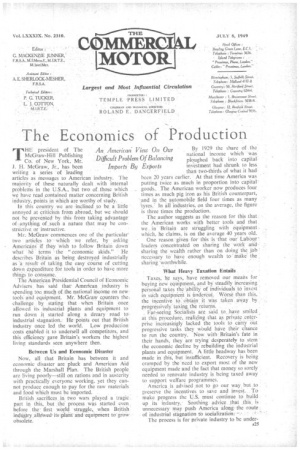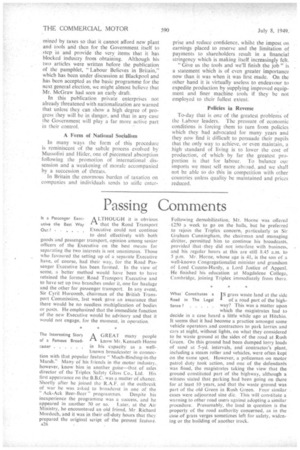The Economics of Production
Page 1

Page 2

If you've noticed an error in this article please click here to report it so we can fix it.
Imports B
THE president of The McGraw-Hill Publishing Co. of New York. Mr. 3. H. McGraw, Tr., has been writing a series of leading articles as Messages to American industry. The majority of these naturally dealt with internal problems in the U.S.A., but two of those which we have read contained matter concerning British industry, points in which are worthy of study.
In this country. we are inclined to be a little annoyed at criticism from abroad, but we should not be preventedby this from taking advantage' of anything of .snch a nature that may be constriictive or instructive.
Mr.. McGraw commences one of the particular' two articles to -Which we refer, by asking AmeriCiik if they wish to follow Britain down what 116 terms the "economic skids." . He describes Britain as being destroyed industrially as 'a result Of taking the easy course of cutting down expenditure for tools in order to have more things to consume..
The American Presidential Council of Economic Advisers, has said that American industry is spending to much of. the national income on new tools: and equipment. Mr. McGraw counters the challenge . by stating that when Britain once allowed its industrial plants and equipment to run down it started along a dreary rOad to industrial stagnation.. He points out that British industry once led the world. Low production costs enabled it to undersell all competitors, and this efficiency gave Britain's workers the highest living standards seen anywhere then.
An American
Difficult Proble Between Us and Economic Disaster Now, all that Britain has between it and economic disaster are pluck and American Aid through the Marshall Plan. The British people are living poorly—still on rations and in austerity with practically everyone working, yet they cannot produce enough to pay for the raw materials and food which must be imported.
British sacrifices in two wars played a tragic part in this, but the process was started even. before thefirst world struggle, when British: inchisfi-yallOwed its •Plaiitand equipment to grow obsolete. View On Our By 1929 the share of the national income which was ploughed back into capital, y ExPor ts investment had shrunk to less than two-thirds of what it had: been 2.0 years earlier. At that time America was putting twice as much in proportion into capital' _ goods. The American workeinow produces four times as much pig iron as his British counterpart, 'and in the automobile field four times as many 'tyres.In all industries, on the average, the figure is three times the production.
The author suggests as the reason for this that the American works with better tools and that we.. in Britain are struggling with equipment , which, he claims, is on the average 40 years old.
One reason 'given fOr this is 'that Our Labour' leaders concentrated •on Sharing the'work and: sharing the wealth 'rather than on doing the necessary to have enough wealth to'idakel the, sharing -worthwhile.
in Of Balancing
• What Heavy Taxation 'Entails Taxes, he says, have removed our means for buying new CqUipnient, and by steadily increasing personal taxes the ability of individuals toinvest in such _equipment is iindereut, Worse than this . the incentive to Ohtain. it was taken away by progressively -taxing the reiturs. Far-seeing. ,Socialists are said to, have smiled. at this procedure, renNing that ks priv,ate.enterprise increasingly lacked the tools tO carry Out progressive tasks they wbuld have their chance to run the country; Now with Britain's fate in their hands, they are trying. desperately to stern . the economic decline by rebuilding the industrial plants and equipment. A little headway has been made in this, but insufficient. Recovery is being cramped by the 'need to export most of the new equipment made and the fact that money so sorely needed to renovate industry is being taxed away to support welfare programmes.
America .is advised not to go our way, but to preserve the incentives to save and invest. , To make progress the U.S. must continue to build. up its industry.. Soothingadvice that this_ is unnecessary may push America alongthe -route of industrial stagnatiOn to §-ocializatiOn: • ' The process is for private industry to be under mined by taxes so that it cannot afford new plant and tools and then for the Government itself to step in and provide the very items that it has blocked industry from obtaining. Although his two articles were written before the publication of the pamphlet, "Labour Believes in Britain," which has been under discussion at Blackpool and has been accepted as the basic programme for the next general election, we might almost believe that Mr. McGraw had seen an early draft.
In this publication private enterprises not already threatened with nationalization are warned that unless' they can show a high degree of progress they will be in danger, and that in any case the Government will play a far more active part in their control.
A Form of National Socialism In many ways the form of this procedure is reminiscent of the subtle process evolved by Mussolini and Hitler, one of piecemeal absorption following the promotion of international dissension and a weakening of morale accompanied by a succession of threats.
In Britain the enormous burden of taxation on companies and individuals tends to stifle enter prise and reduce confidence, whilst the impost on earnings placed to reserve and the limitation of payments to shareholders result • in a financial stringency which is making itself increasingly felt.
"Give us the tools and we'll finish the job is a statement which is of even greater importance now than it was when it was first made. On the other haticl it is virtually useless to endeavour to expedite production by supplying improved equipment and finer machine tools if they be not employed to their fullest extent.
Policies in Reverse To-day that is one of the greatest problems of the Labour leaders. The pressure of economic conditions is forcing them to turn from policies which they had advocated for many years and they now find it difficult to persuade their pupils that the only way to achieve, or even maintain, a high standard of living is to lower• the cost of production, of which by far the greatest proportion is that for labour. To balance our imports we must sell more abroad, and we shall not be able to do this in competition with other countries unless quality be maintained and prices reduced.


























